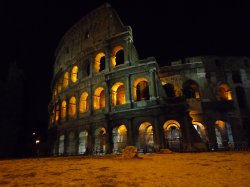I started my photographic journey about 3 years ago after purchasing a Nikon D40 for a magazine that a colleague of mine and I started. I shot approx. 10,000 or more photos on that camera in the first 2 years, all of them on auto. I have now upgraded to a D90 and other various lenses.
Earlier this year I enrolled in my first photography class for my Photography / Graphic Design major. Ever since picking up that first camera I have been hooked and haven't been able to put the camera down, after taking that first class I realized everything I was doing wrong and now have a better understanding of composition, exposure, lighting, etc. As always though, there is more to learn and I am excited to learn it.
I have the desire to be a great photographer, I mean truly great. So my question to this wide audience of professionals and amateurs alike, is "What does it take to be great?" What makes the distinguished photographers of today and of the past so revered? As amateurs where do we start? I figure that going to school and learning the basics as well as the advanced techniques is the first thing, but what do we do after that?
I appreciate any and all the advice that is given, and look forward to hearing different points of view. Thanks in advance
Earlier this year I enrolled in my first photography class for my Photography / Graphic Design major. Ever since picking up that first camera I have been hooked and haven't been able to put the camera down, after taking that first class I realized everything I was doing wrong and now have a better understanding of composition, exposure, lighting, etc. As always though, there is more to learn and I am excited to learn it.
I have the desire to be a great photographer, I mean truly great. So my question to this wide audience of professionals and amateurs alike, is "What does it take to be great?" What makes the distinguished photographers of today and of the past so revered? As amateurs where do we start? I figure that going to school and learning the basics as well as the advanced techniques is the first thing, but what do we do after that?
I appreciate any and all the advice that is given, and look forward to hearing different points of view. Thanks in advance



